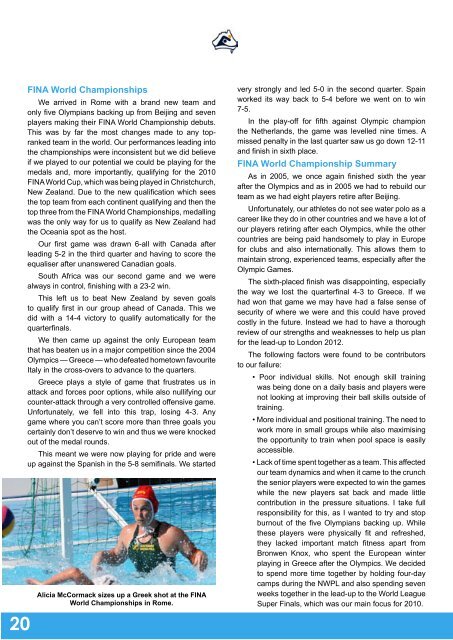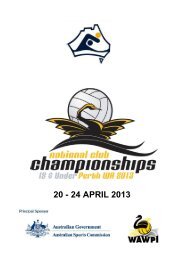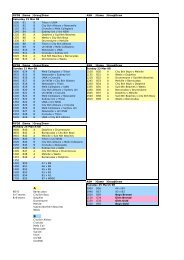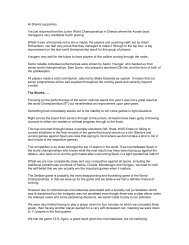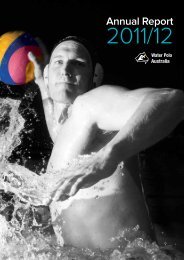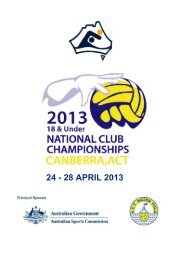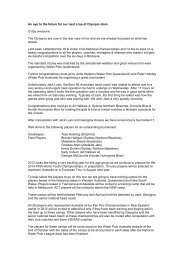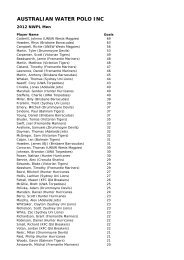2009-10 Annual Report - Australian Water Polo Inc
2009-10 Annual Report - Australian Water Polo Inc
2009-10 Annual Report - Australian Water Polo Inc
Create successful ePaper yourself
Turn your PDF publications into a flip-book with our unique Google optimized e-Paper software.
20<br />
FINA World Championships<br />
We arrived in Rome with a brand new team and<br />
only five Olympians backing up from Beijing and seven<br />
players making their FINA World Championship debuts.<br />
This was by far the most changes made to any topranked<br />
team in the world. Our performances leading into<br />
the championships were inconsistent but we did believe<br />
if we played to our potential we could be playing for the<br />
medals and, more importantly, qualifying for the 20<strong>10</strong><br />
FINA World Cup, which was being played in Christchurch,<br />
New Zealand. Due to the new qualification which sees<br />
the top team from each continent qualifying and then the<br />
top three from the FINA World Championships, medalling<br />
was the only way for us to qualify as New Zealand had<br />
the Oceania spot as the host.<br />
Our first game was drawn 6-all with Canada after<br />
leading 5-2 in the third quarter and having to score the<br />
equaliser after unanswered Canadian goals.<br />
South Africa was our second game and we were<br />
always in control, finishing with a 23-2 win.<br />
This left us to beat New Zealand by seven goals<br />
to qualify first in our group ahead of Canada. This we<br />
did with a 14-4 victory to qualify automatically for the<br />
quarterfinals.<br />
We then came up against the only European team<br />
that has beaten us in a major competition since the 2004<br />
Olympics — Greece — who defeated hometown favourite<br />
Italy in the cross-overs to advance to the quarters.<br />
Greece plays a style of game that frustrates us in<br />
attack and forces poor options, while also nullifying our<br />
counter-attack through a very controlled offensive game.<br />
Unfortunately, we fell into this trap, losing 4-3. Any<br />
game where you can’t score more than three goals you<br />
certainly don’t deserve to win and thus we were knocked<br />
out of the medal rounds.<br />
This meant we were now playing for pride and were<br />
up against the Spanish in the 5-8 semifinals. We started<br />
Alicia McCormack sizes up a Greek shot at the FINA<br />
World Championships in Rome.<br />
very strongly and led 5-0 in the second quarter. Spain<br />
worked its way back to 5-4 before we went on to win<br />
7-5.<br />
In the play-off for fifth against Olympic champion<br />
the Netherlands, the game was levelled nine times. A<br />
missed penalty in the last quarter saw us go down 12-11<br />
and finish in sixth place.<br />
FINA World Championship Summary<br />
As in 2005, we once again finished sixth the year<br />
after the Olympics and as in 2005 we had to rebuild our<br />
team as we had eight players retire after Beijing.<br />
Unfortunately, our athletes do not see water polo as a<br />
career like they do in other countries and we have a lot of<br />
our players retiring after each Olympics, while the other<br />
countries are being paid handsomely to play in Europe<br />
for clubs and also internationally. This allows them to<br />
maintain strong, experienced teams, especially after the<br />
Olympic Games.<br />
The sixth-placed finish was disappointing, especially<br />
the way we lost the quarterfinal 4-3 to Greece. If we<br />
had won that game we may have had a false sense of<br />
security of where we were and this could have proved<br />
costly in the future. Instead we had to have a thorough<br />
review of our strengths and weaknesses to help us plan<br />
for the lead-up to London 2012.<br />
The following factors were found to be contributors<br />
to our failure:<br />
• Poor individual skills. Not enough skill training<br />
was being done on a daily basis and players were<br />
not looking at improving their ball skills outside of<br />
training.<br />
• More individual and positional training. The need to<br />
work more in small groups while also maximising<br />
the opportunity to train when pool space is easily<br />
accessible.<br />
• Lack of time spent together as a team. This affected<br />
our team dynamics and when it came to the crunch<br />
the senior players were expected to win the games<br />
while the new players sat back and made little<br />
contribution in the pressure situations. I take full<br />
responsibility for this, as I wanted to try and stop<br />
burnout of the five Olympians backing up. While<br />
these players were physically fit and refreshed,<br />
they lacked important match fitness apart from<br />
Bronwen Knox, who spent the European winter<br />
playing in Greece after the Olympics. We decided<br />
to spend more time together by holding four-day<br />
camps during the NWPL and also spending seven<br />
weeks together in the lead-up to the World League<br />
Super Finals, which was our main focus for 20<strong>10</strong>.


